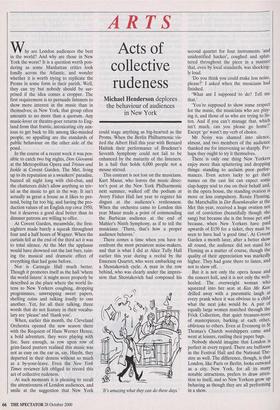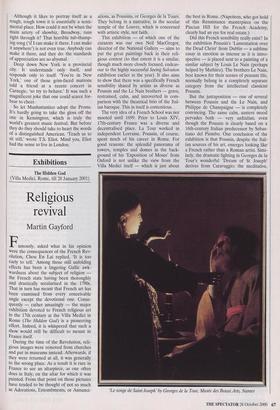ARTS
Acts of collective rudeness
Michael Henderson deplores the behaviour of audiences in New York
Wby are London audiences the best in the world? And why are those in New York the worst? It is a question worth pon- dering as some Manhattan critics look fondly across the Atlantic, and wonder whether it is worth trying to replicate the Proms in some form in their parish. Well, they can try but nobody should be sur- prised if the idea comes a cropper. The first requirement is to persuade listeners to show more interest in the music than in themselves; in New York, that group often amounts to no more than a quorum. Any music-lover or theatre-goer returns to Eng- land from that frantic, intoxicating city anx- ious to get back to life among like-minded people, so appalling are the standards of public behaviour on the other side of the pond.
In the course of a recent week it was pos- sible to catch two big nights, Don Giovanni at the Metropolitan Opera and Tristan and Isolde at Covent Garden, The Met, living up to its reputation as a swankers' paradise, buzzed all night long with chit-chat, and the chatterers didn't allow anything so triv- ial as the music to get in the way. It isn't actually as great a house as it likes to pre- tend, being far too big, and having the pro- duction values of an English rep circa 1950, but it deserves a good deal better than its dimmer patrons are willing to offer.
At Covent Garden, meanwhile, the first- nighters made barely a squeak throughout four and a half hours of Wagner. When the curtain fell at the end of the third act it was to total silence. At the Met the applause would have drowned out the last bars, ruin- ing the musical and dramatic effect of everything that had gone before.
Nor is Carnegie Hall much better. Though it promotes itself as the hall 'where the world listens' it might more properly be described as the place where the world lis- tens to New Yorkers coughing, dropping programmes, unwrapping sweet papers, shelling coins and talking loudly to one another. Yet, for all their talking, three words that do not feature in their vocabu- lary are 'please' and 'thank you'.
When, earlier this month, the Cleveland Orchestra opened the new season there with the Requiem of Hans Werner Henze, a bold adventure, they were playing with fire. Sure enough, as row upon row of grim-faced punters realised this music was not as easy on the ear as, say, Haydn, they departed in their dozens without so much as a by-your-leave. Even the New York Times reviewer felt obliged to record this act of collective rudeness.
At such moments it is pleasing to recall the attentiveness of London audiences, and smile at the suggestion that New York could stage anything as big-hearted as the Proms. When the Berlin Philharmonic vis- ited the Albert Hall this year with Bernard Haitink their performance of Bruckner's Seventh Symphony could not fail to be enhanced by the maturity of the listeners. In a hall that holds 6,000 people not a mouse stirred.
This contrast is not lost on the musicians. Kurt Masur, who leaves the music direc- tor's post at the New York Philharmonic next summer, walked off the podium at Avery Fisher Hall last year to register his disgust at the audience's restlessness. When the orchestra came to London this year Masur made a point of commending the Barbican audience at the end of Mahler's Ninth Symphony, as if to tell the musicians: 'There, that's how a proper audience behaves.'
There comes a time when you have to confront the most persistent noise-makers, and that is what I did at Alice Tully Hall earlier this year during a recital by the Emerson Quartet, who were embarking on a Shostakovich cycle. A man in the row behind, who was clearly under the impres- sion that Shostakovich had composed his `It's amazing what they can do these days.' second quartet for four instruments 'and unidentified hacker', coughed and splut- tered throughout the piece in a manner that, even by local standards, was shocking- ly loud.
`Do you think you could make less noise, please?' I asked when the musicians had finished.
`What am I supposed to do? Tell me that.'
`You're supposed to show some respect for the music, the musicians who are play- ing it, and those of us who are trying to lis- ten. And if you can't manage that, which isn't much, can you please go home?' Except 'go' wasn't my verb of choice.
Mr Noisy was shamed into silence, almost, and two members of the audience thanked me for intervening so sharply. Per- haps they ought to try it themselves.
There is only one thing New Yorkers enjoy more than spluttering and dropping things: standing to acclaim poor perfor- mances. Even actors lucky to get their names on the cast list can expect some clap-happy soul to rise on their behalf and, in the opera house, the standing ovation is more or less compulsory. Renee Fleming, the Marschallin in Der Rosenkavalier at the Met this year, received a huge ovation not out of conviction (beautifully though she sang) but because she is the house pet and because, when New Yorkers have paid upwards of $150 for a ticket, they must be seen to have had 'a good time'. At Covent Garden a month later, after a better show all round, the audience did not stand for Fleming as a matter of course, though the quality of their appreciation was markedly higher. They had gone there to listen, and not to show off.
But it is not only the opera house and the concert hall, and it is not only the well- heeled. The overweight woman who squeezed into her seat at Kiss Me Kate drilled away with a pneumatic laugh at every prank when it was obvious to a child what the next joke would be. A pair of equally large women marched through the Frick Collection, that quiet treasure-trove of masterpieces, barking at each other, oblivious to others. Even at Evensong in St Thomas's Church worshippers came and went at leisure, rustling their paper bags.
Nobody should imagine that London 15 perfect in every regard. There are buffoons in the Festival Hall and the National The- atre as well. The difference, though, is that London, like Paris or Berlin, looks outward as a city. New York, for all its many notable attractions, prefers to draw atten- tion to itself, and so New Yorkers grow up behaving as though they are all performing in a show. Although it likes to portray itself as a rough, tough town it is essentially a senti- mental place. How could it not be when the main artery of showbiz, Broadway, runs right through it? That horrible tub-thump- ing song Cif I can make it there, I can make it anywhere') is not even true. Anybody can make it there, and they do: the standards of appreciation are so abysmal.
Deep down New York is a provincial city. It understands only itself, and responds only to itself. 'You're in New York,' one of those grim-faced matrons told a friend at a recent concert in Carnegie, 'so try to behave.' It was such a magnificent joke that one could scarce for- bear to cheer.
So let Manhattanites adopt the Proms. It's hardly going to take the gloss off the one in Kensington, which is truly the world's greatest music festival. But before they do they should take to heart the words of a distinguished American. 'Teach us to sit still,' wrote T.S. Eliot. Mind you, Eliot had the sense to live in London.



























































































 Previous page
Previous page